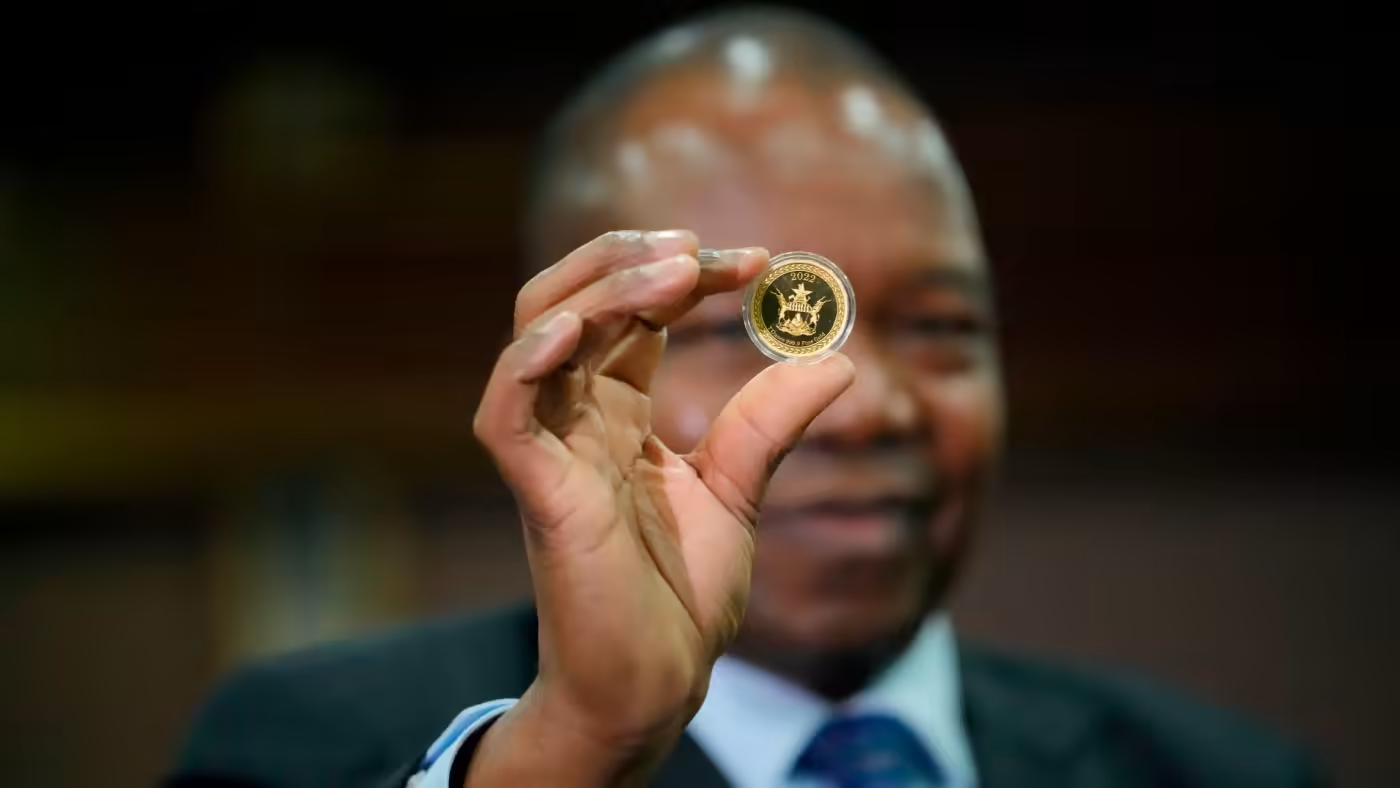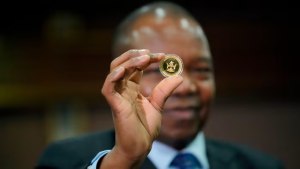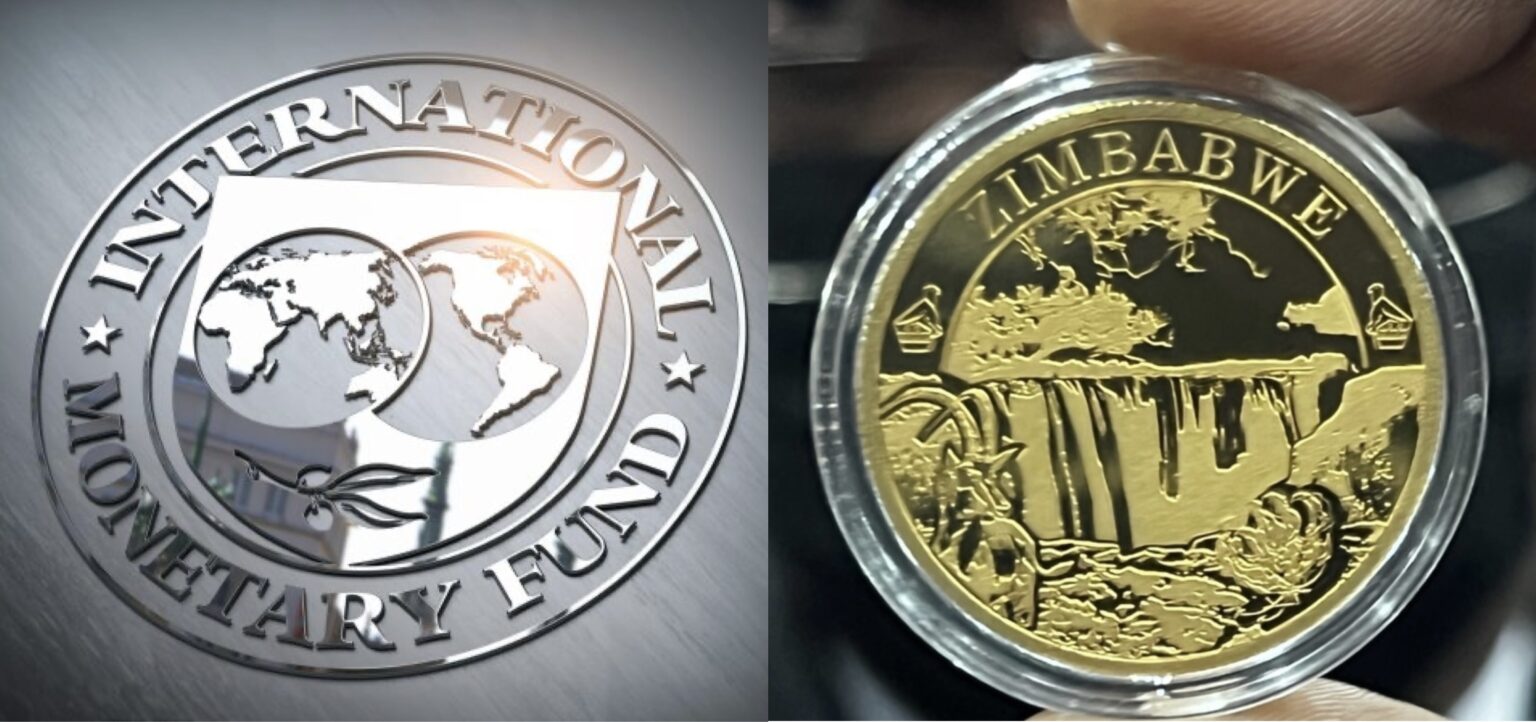Join Our Telegram channel to stay up to date on breaking news coverage
In a bold move, the Reserve Bank of Zimbabwe has disregarded the cautionary advice from the International Monetary Fund and proceeded to sell gold-backed digital tokens valued at 14 billion Zimbabwean dollars, equating to around $39 million.
Zimbabwe’s Bold Economic Gamble Challenges IMF Advice
Interestingly, the tokens’ market value significantly surpasses the official exchange rate of 362 Zimbabwean dollars per US dollar, resulting in a substantial total worth of approximately $38.9 million.
This notable sale of tokens, which took place between May 8 and May 12, was backed by an impressive reserve of 139.57 kilograms of gold.
This move by the Reserve Bank of Zimbabwe is aimed at stabilizing the country’s economy, especially amidst the continuous depreciation of the local currency against the US dollar. To further this objective, a second round of token sales is scheduled, with applications being accepted until May 18.
RBZ Gold-Backed Digital Tokens No.2/2023 Application Form: https://t.co/Sb6GEc4yxO
— Reserve Bank of Zimbabwe (@ReserveBankZIM) May 12, 2023
The bank hopes to expand the availability and usage of value-preserving instruments in the economy by enhancing the divisibility and accessibility of investment instruments.
The decision to pursue a gold-backed currency comes despite the IMF’s cautionary stance. The IMF had recommended that Zimbabwe liberalize its foreign-exchange market instead of pursuing a gold-backed currency, citing potential risks to macroeconomic and financial stability, legal and operational concerns, governance risks, and the cost of depleting foreign exchange reserves.
Zimbabwe has been grappling with currency volatility and inflation for over a decade. Following a period of hyperinflation that rendered the local currency worthless, the country adopted the US dollar as its official currency in 2009. However, in 2019, the Zimbabwe dollar was reintroduced in an attempt to revive the local economy, leading to renewed volatility.
Despite the IMF’s reservations, the Reserve Bank of Zimbabwe remains committed to leveraging the gold-backed tokens as a means of addressing the country’s economic challenges. The future impact of these digital tokens on the nation’s financial landscape and overall stability remains uncertain.
Here’s What Caused Zimbabwe to Pursue The Sale of Gold-Backed Digital Tokens
Zimbabwe’s central bank sold gold-backed digital tokens to investors in an effort to reduce demand for US dollars and tackle the country’s economic challenges.
Individuals could purchase the tokens at a minimum price of $10, while corporations and other entities had a minimum purchase requirement of $5,000. The tokens come with a mandatory vesting period of 180 days and can be stored in e-gold wallets or on e-gold cards.
The Reserve Bank of Zimbabwe’s move to pursue a gold-backed currency came despite the cautionary stance of the International Monetary Fund (IMF). The IMF expressed concerns about potential risks to macroeconomic and financial stability, legal and operational issues, governance risks, and the depletion of foreign exchange reserves.
In response, an IMF spokesperson stated that “a careful assessment should be conducted to ensure the benefits from this measure outweigh the costs and potential risks.”
The financial institution strongly encouraged Zimbabwean authorities to employ conventional strategies to tackle economic challenges instead. These strategies included the maintenance of a rigorous monetary-policy stance and expediting the process of liberalizing the foreign-currency market.
Specifically, this required the elimination of restrictions on the exchange rate utilized for transactions conducted by banks, authorized dealers, and businesses. By implementing these measures, it was believed that Zimbabwe could foster greater stability and resilience within its economic landscape.
Despite the IMF’s reservations, the Reserve Bank of Zimbabwe remained committed to leveraging the gold-backed tokens as a means of addressing the country’s economic challenges.
The decision was made due to the local currency’s continued depreciation against the US dollar and the ongoing inflation, which the country had been grappling with for over a decade.
In the year preceding the token sale, the value of the Zimbabwean dollar experienced a significant decline of 40% in comparison to the US dollar. This depreciation was reflected in the exchange rates, with the currency trading at 1,070 on the official market and exhibiting a range of 1,500 to 2,300 on the parallel market.
The substantial devaluation of the Zimbabwean dollar against the greenback showcased the challenges faced by the national currency, as it struggled to maintain a stable and favorable position in relation to the US dollar.
The disparity between the exchange rates observed in the official and parallel markets emphasized the complex nature of the economic landscape, with varying rates adding to the prevailing climate of uncertainty and volatility in the currency markets.
The IMF had also raised issues with the Central African Republic’s adoption of Bitcoin as legal tender the previous year, a decision the nation reversed a year later.
Zimbabwe’s Complex Journey with Cryptocurrencies – Balancing Enthusiasm and Skepticism in the Face of Economic Challenges
Zimbabwe has had a complex history with cryptocurrencies, characterized by both enthusiasm and skepticism. The country’s economic challenges, such as hyperinflation and currency instability, have led many Zimbabweans to seek alternative means of storing and transferring value, making cryptocurrencies an appealing option.
In the early years of cryptocurrency emergence, Bitcoin offered a decentralized and inflation-resistant currency that seemed immune to the fluctuations and devaluations of the Zimbabwean dollar. It provided a way for individuals to protect their wealth and conduct cross-border transactions without the need for traditional banking systems.
However, the Zimbabwean government initially viewed cryptocurrencies with suspicion. In 2017, the Reserve Bank of Zimbabwe (RBZ) issued a statement warning the public about the risks associated with cryptocurrencies, citing concerns such as money laundering, fraud, and consumer protection.
The RBZ directed financial institutions to refrain from providing services to cryptocurrency-related businesses.
Despite the cautious stance of the government, the interest in cryptocurrencies persisted. Zimbabwe witnessed a surge in peer-to-peer Bitcoin trading, with platforms like Golix gaining popularity.
In 2018, the RBZ took a more proactive approach and established a regulatory sandbox to explore the potential benefits and risks of cryptocurrencies. The sandbox allowed select cryptocurrency exchanges to operate under RBZ supervision, subject to compliance with certain guidelines and regulations.
More recently, the Reserve Bank of Zimbabwe has been exploring the concept of a central bank digital currency (CBDC) as a way to enhance financial inclusion and reduce transaction costs. The proposed CBDC would be a digitized form of the Zimbabwean dollar, allowing for faster and more efficient transactions while maintaining regulatory oversight.
Zimbabwe’s history with cryptocurrencies reflects a combination of skepticism, regulatory caution, and growing acceptance. While the government has expressed concerns, the demand for cryptocurrencies persists among Zimbabweans seeking alternative financial solutions in the face of economic challenges.
The evolving regulatory landscape and exploration of CBDCs indicate a willingness to adapt and harness the potential benefits of digital currencies in the country’s financial ecosystem.
Read More:
Join Our Telegram channel to stay up to date on breaking news coverage





